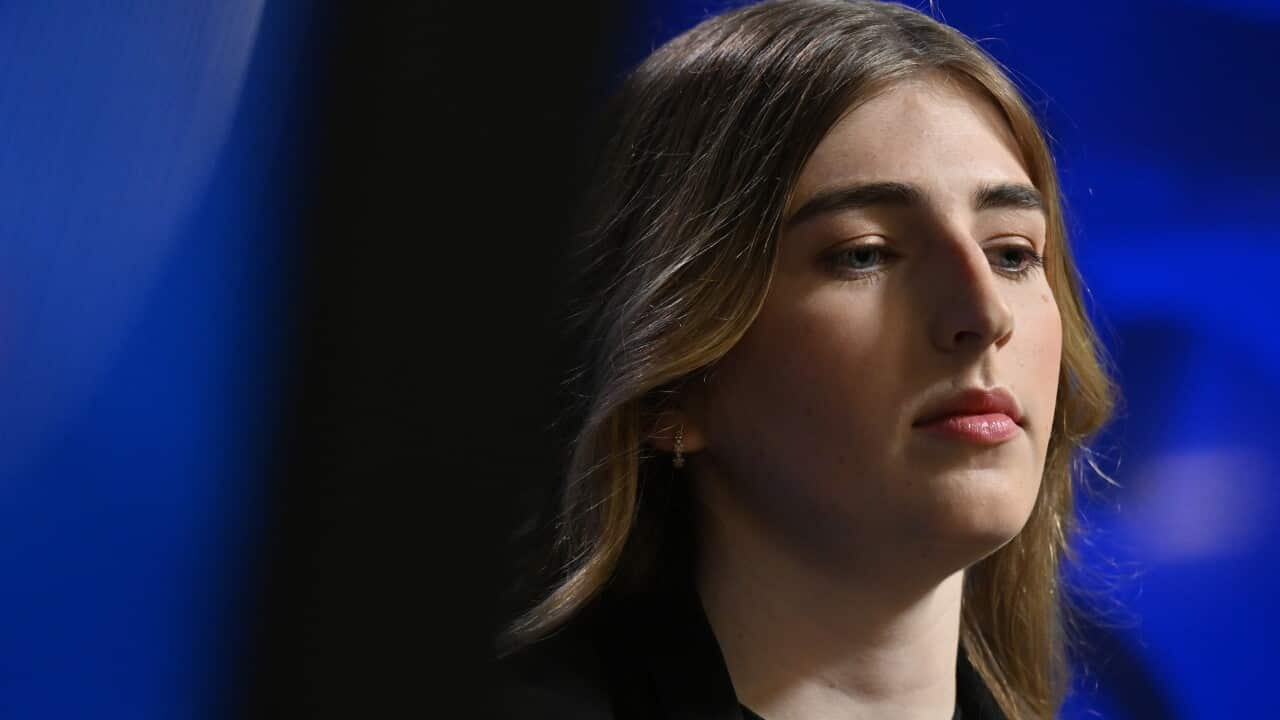KEY POINTS:
- Transgender activist Georgie Stone says she is 'genuinely fearful' after neo-Nazi rally.
- Ms Stone described the last four weeks as a month of 'hell' for the trans community.
- She called on politicians to stop 'using us a football'.
Actor and transgender activist Georgie Stone says she is "genuinely fearful" for her safety, describing the weeks since neo-Nazis joined an anti-trans rally as "hell".
Becoming the youngest woman to address the National Press Club in Canberra on Tuesday, the Neighbours star warned "mass hysteria" about gender-affirming care was having "devastating real world consequences" on the transgender community.
Ms Stone was the youngest person to be granted puberty blockers, aged 10, after leading the push for a 2017 law change which meant transgender children would no longer need Family Court approval to access hormone treatment.
She laid down the gauntlet to trans allies, saying: "You can't celebrate with us at World Pride and then scatter when the attacks come".
, performing Nazi salutes on the steps of Victorian parliament.
Ms Stone described the past month as "incredibly difficult" for the transgender community, warning that dangerous anti-transgender rhetoric was being amplified across Australia.
"Usually in speeches like these, I try to put on a brave face. But the truth is, I'm genuinely fearful for my safety," she said.
"I'm tired of feeling targeted. I am tired of going to sleep at night worried about what hateful, horrible messages I will wake up to. This last month has been a taste of what has been happening to trans people here and all around the world.

Ms Stone, 22, became the youngest woman to address the National Press Club. Source: AAP / Mick Tsikas
Anti-trans laws
Transgender rights were became a flashpoint in the May federal election, .
While Ms Deves suffered a heavy defeat, Ms Stone described her candidacy as "destructive" and implored politicians to "stop using us as a weapon".
"I'm still unlearning the shame that I've been taught to have about myself since childhood, so just imagine all those trans kids out there who are seeing that stuff," she said.
The US has seen a rise in state legislation which critics say would undermine transgender rights, including legal definitions of gender based on biological sex, and bans on gender-affirming care.
Gender-affirming care covers a wide range of interventions - from social and behavioural to medical - aimed at allowing a person's life to align with their gender identity.

Neo-Nazis appeared at an anti-transgender rights rally last month. Source: AAP / James Ross
Ms Stone said the trans community needed support from its allies to shoulder the "crushing and relentless" burden it was being placed under.
"If you want the pride and the glitter and the confetti, you also have to stand with us when it's uncomfortable and scary, too," she said.
"What will it take for our pleas for support and dignity and safety to breakthrough? How many more trans people have to die for this to be worthy of your attention? How many more Neo-Nazis need to walk the streets?"
Media coverage of transgender rights
Ms Stone also criticised media coverage of transgender rights, saying its framing of the topic as "the trans debate" saw members of the community "kicked around like footballs".
She said anti-transgender activists with no experience were incorrectly portrayed as experts, while information on gender affirming care had been "distorted and twisted".
"The most nonsensical message in the public sphere right now is that we're being taught to believe that we live in a world where drag queens are dangerous, but Nazis should be protected for their right to free speech when they stand on the steps of Parliament House and call for the genocide of a minority group," she said.
"Even worse, the weaponising of language by anti-trans groups, to suggest that we're a predatory danger to young people, is a gross offence to survivors everywhere."
Ms Stone recounted her childhood, in which her school forced her to change in the male changerooms and her classmates labelled her a "freak".
While she was lucky to have supportive parents and lawyers prepared to work pro bono, she said the experience of moving through the court system left her "feeling like a burden".
"[It was] like I was making life hard for everyone else by needing this treatment," she said.
"But this wasn't my fault. I didn't ask for this. This issue should never have been involved with the courts in the first place."










